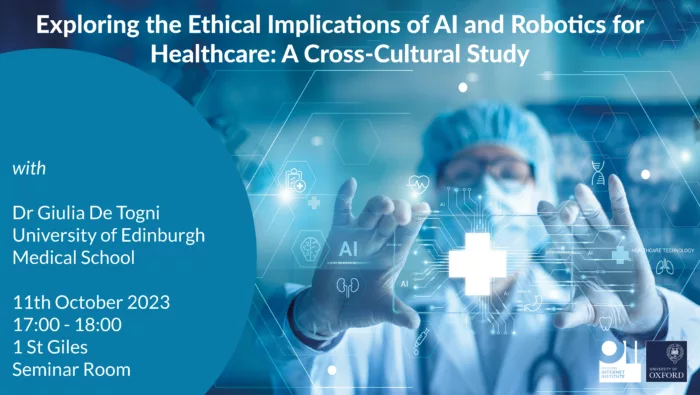About
The future of healthcare, and the role of AI and robotic innovation within this, is a topic of immediate and tangible societal relevance. Governments in technologically advanced nations are progressively allocating substantial resources to AI and robotic healthcare innovation in the face of the need for higher precision, shortages of healthcare personnel, and an increase in the number of older and frailer people.
This talk draws on an interdisciplinary, comparative qualitative study (titled ‘Caring Machines’) funded by the Wellcome Trust and for which the speaker carried out 14 months of ethnographic fieldwork in 2022-2023 in Japan and the UK. This included the collection of 80 interviews with engineers developing socially/physically assistive robotic technologies, and end-users; and 40 weeks of participant observation at robotics laboratories and assisted living facilities where end-users were introduced to the technology. The aim of the project ‘Caring Machines’ is to trace the journey of AI and robotics innovation in care, from research laboratories to end-users, while highlighting the ethical considerations and embodied experiences associated with these technologies across different cultural contexts.
Drawing on this cross-cultural ethnographic research, the talk addresses timely questions such as: How may AI and robotic healthcare technologies shape and be shaped by different understandings of the role and the value of human care? How to preserve human dignity when care is provided by AI/robots? How to ensure end-users become more involved in co-designing these technologies?
Dr Giulia De Togni has been a Postdoctoral Research Fellow in AI and Health at the University of Edinburgh Medical School since 2019. She received her MSc in social anthropology from the University of Oxford (2015) and a PhD in social anthropology from UCL (2019). Dr De Togni’s research revolves around exploring the social and ethical implications of current and future advancements in AI and robotics within the health and social care sectors. In 2022, she was awarded a 3-year Wellcome Postdoctoral Research Fellowship in Humanities and Social Science and started the project ‘Caring Machines.’ Throughout the course of her Fellowship, Dr De Togni established collaborations with the Alan Turing Institute, Edinburgh Centre for Robotics, Bayes Centre, Heriot-Watt University, National Robotarium, The University of Tokyo, Waseda University, Tohoku University, Kyoto University, Osaka University, AIST (Japan’s National Institute of Advanced Industrial Science and Technology), and RIKEN (the largest research institute in Japan, with 3,000+ members).

